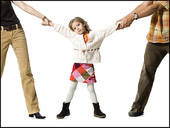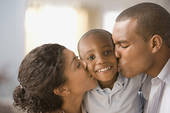Three Impediments to Discussing Divorce With Young Children, and a Three Step Process to do it Well
Discussing divorce with young children is probably every parent’s worst nightmare. All the promises you made yourself when you first embarked on the parenthood journey crumble into dust, making you feel like a failure.
Discussing divorce with young children pits you face to face with your mistakes, your regrets, your broken dreams and the loss of your future wishes.
Discussing divorce with young children can make you feel responsible for ruining the lives of your innocent children, and or try to buy their allegiance against your partner. You are in pain and you imagine you are causing your children pain too. Not a pretty spectacle.
BUT Discussing divorce with young children can be positive and allow you to be good parents if you own the benefits of doing so, and recognize the impediments in the process.
Discussing divorce with young children: Positive Advantages
• Relief all round when there is honesty, lack of pretense and an awareness that no one has died in the process.
• Encourages sharing of feelings that can bring family members closer
• Fosters empathy through the notion that no one is perfect – with everyone having flaws.
• Avoids children imagining that they are the cause of the rift and have to rectify it
• Builds resiliency in the children
• Promotes agency and autonomy within the children as they approach sensitive teenage years
Discussing Divorce with Young Children – impediments that get in the way
1. Underestimating What Kids Already know
You may have tried hard to avoid fighting in front of the kids or showing any discomfort with one and other when the kids were around. But kids are hypersensitive to the emotional climate around their parents and know what’s going on between them before parents can put words to it. That’s why discussing divorce with young children is probably much easier for them than for you.
Children can feel the coldness when you barely make eye contact with each other, or speak as if you were conducting a business transaction. Your children can see your exasperation and fury when you sigh, roll your eyes or mutter under your breath. They know things aren’t okay between you when one of you is rarely home until late at night, or when you find excuses not to do stuff together. That’s why discussing divorce with young children is so relieving when they have context in which to understand your awkward communications.
Kids can sniff out a grumpy or passive aggressive interactions between their parents. They are acutely aware of your irritability, lack of energy or withdrawal into a state of barely being present – depression. That’s why discussing divorce with young children is important so that they don’t fear losing you to when you retreat into your inner world for comfort.
2. Pretending you are okay
Kids know when you are upset, in pain, tired or needy. So pretending you are okay is not going to cut it. It isn’t noble or sacrificial to pretend that you are fine because you don’t want to burden or worry your children. They are already concerned because you are the source of their safety and emotional security. Pretending makes them anxious because they know you are covering up.
Discussing divorce with young children is vital so that you don’t have to absent yourselves and in effect ‘orphan’ your kids by pretending everything is hunky dory, only to check out on them in some other way – whether it’s by sleeping too much, drinking, staying out, or having secret conversations with others. They will know it’s not true when you slip up in your daily routines and forget things – which is understandable given the enormous stress you are going through contemplating divorce. But you don’t need to conflate sacrificial silence with protecting the kids – you are in some way abandoning them emotionally.
3. Guilt, Shame, Anger and Resentment
Discussing divorce with young children is severely impeded by the powerful emotions of guilt, shame, anger and resentment.
Every parent telling their child about getting divorced is consumed with guilt.
Guilt makes you ache for forgiveness. When you are desperate for your kids to forgive you then you are not taking care of them, but satisfying your own needs. So it’s important to process your guilt separately from them, especially if either of you as parents are being made to feel guilty by the other. Couples therapy is very important to manage guilt before you move to discussing divorce with young children.
Guilt inevitably leads to immense shame. An emotion that wants to make you disappear. Shame too can lead you to look to your kids to help raise your self-esteem and self-worth, to make you feel like a decent person. Yes, your children will be your best source of comfort, but once again it becomes about taking care of your emotions and not their needs. Deep shame shuts you down and makes it impossible to begin the process of discussing divorce with young children. You’ll feel like you can’t talk about it; it’s never the right time or place and make sure you are too busy to do so.
Anger and resentment are huge motivators to push away people that might hurt you, such as the spouse you are divorcing. You can’t hide it from the kids and they will be torn between trying to protect both of you when one or the other throws out years’ worth of resentments in a bitter an acrimonious way.
Your kids don’t want to think of either parent as the bad one, the guilty one, the abandoning one or the one who ruined everything.
They want and NEED to hold onto the good parts of both parents, even when you as adults in your painful process forget about the positive parts of your marriage.
You may experience a strong pull to get the kids on your side and paint your spouse in a bad light. It may not be deliberate because in a fit of anger, you want your emotions validated and the best way is to align the kids with your victimhood. Discussing divorce with young children becomes impossible if you are caught in this trap of wanting to be vindicated and use your kids for that purpose.
Discussing Divorce With Young Children – a three step process
1. Get your own emotions seen to, validated and soothed in your own personal therapy. Friends are helpful and can lend an ear when you are overwhelmed and you need someone on the fly. But in your own therapy, you’ll be able to understand your guilt, shame, anger, resentment, hatred, fears for the future and wish to be a good parent. You can process your own parents’ marriage and it’s effect on you, and mourn the loss of the relationship that is changing to co-parenting. Grief therapy within your individual counseling is an important constituent. THEN AND ONLY THEN can you be ready for the journey of discussing divorce with young children.
If you feel guilty and ashamed of your feelings when you get to discussing divorce with young children then you are in effect showing them that they need to feel guilty and ashamed of their feelings. They will take their cue from you. So please, take care of yourself in breakup-and separation therapy.
2. Enter in couples therapy with the goal of transitioning into divorce and air out all your built up grievances and heartache. It’s better to do it in the safe arms of a therapist who will be there for you both, and model for you how to be there for your children.
Figure out the best time, place and situation when discussing divorce with young children will be tolerable for you both. So many times one partner is ready earlier than the other – wanting to get it over with and move one, while the other isn’t ready to make it real even though they know it is (the guilt and shame creeping in again.) Couples therapy can hold you together in a caring place making room for your different rhythms so that when you are both ready, discussing divorce with young children will be meaningful and lead to new dialogue.
3. Switch from couples to family therapy. That means you bring the children into the conversation and begin discussing divorce from a place of care for them.
- Check in with them to take their emotional temperature before telling them anything. Then you can tailor the information, amount, and pace. Let them guide you – remember it’s not about you getting it off your chest, but about them digesting it.
• Be curious and wait for the kids to ask. Don’t dump everything on them in one go
• Be available to your own and their feelings, which may be silent tears, looking down, anxiety or fidgetiness.
• Be factual, giving one bite of information at a time and wait for them to show you they are ready for more.
• Let the therapist guide you by checking in with the kids and you to see how the process feels and when it needs to slow down, pick up or pause.
• Bear in mind that reassurance doesn’t work. Let them have their reactions and respect their way of handling it with the help of the therapist.
• Don’t hide or minimize your feelings. That will come across as a message that your kids need to do the same.
• Remember you have only just started discussing divorce with young children. It’s an ongoing conversation, that will involve making them feel safe to share their love for both parents without upsetting one or the other.
Copyright, Jeanette Raymond, Ph.D. 2022
You may also like:
Is guilt the stick that motivates you into action?



